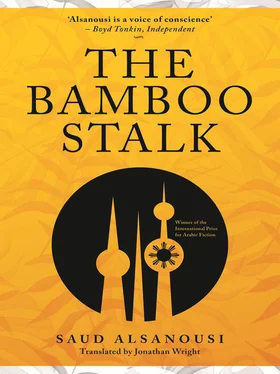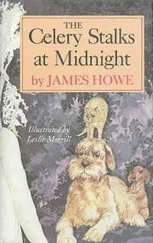There was a heavy silence, then my grandmother said, ‘Yes, you, the man of the house. You’ll deal with that bastard, won’t you?’
She was sure the cook had done it, so my father had to explain. ‘No, it was me who did it, Mother,’ he said.
She clasped her chest with the palm of her hand, as if her heart had sunk and she had to hold it in place. She put her hands over her ears and then over her face. ‘She’ll have to leave,’ she said, in a voice that was hardly audible.
‘I’m not in the habit of going back on what I say or do, and sometimes there’s no going back anyway,’ my father answered coldly.
His mother was about to collapse. Despite appearances, my father was also close to collapse. She took her hands off her face, sat down and pounded the dining table with her fist.
‘You can write stuff like that for your crazy readers, but not for me,’ she shouted.
‘I made a mistake when I made this baby,’ my father replied. ‘But I don’t want to make a bigger mistake by abandoning it.’ My mother said she had never heard him raise his voice so loud, and this was at his mother!
My three aunts had gathered at the kitchen door after hearing all the noise. They didn’t dare come closer.
‘That slut Josephine must leave the country tomorrow,’ Grandmother said.
My mother clasped her hands together in front of her face and wept.
‘Yes, yes, madam, I’ll leave tomorrow,’ she said.
My father silenced her with his hand. ‘She won’t leave as long as she’s carrying a part of me in her womb,’ he said.
His mother stood up straight, her hands resting on the table in front of her. ‘The girl at college, the one who. . I’ll arrange the engagement, tomorrow if you like,’ she said.
My father shook his head. ‘It’s too late for that, Mother,’ he said.
‘It’s a disaster, a scandal,’ she shouted between sobs.
She pointed at my aunts at the door. ‘Your sisters, you selfish, despicable man. Who’ll marry them after what you’ve done with the maid?’
Rashid had nothing to say in response.
‘Get out of my house, and take that slut with you. Those crazy books have ruined your mind!’
For a whole week, my mother kept asking my father questions about what had happened in the kitchen that day. ‘Why was she pointing at your sisters?’ she asked. ‘She was talking about books. What was she saying? What were you saying when you shouted in your mother’s face?’
‘He acted out the scene for me and translated the conversation so that I could understand. I cried. Your father made me cry many times, José.’
My mother cried that day because my father hadn’t been open with his mother about the marriage. She cried even more because she knew my father hadn’t rebelled against his mother to protect her or because he wanted to stay with her, but rather to protect me, his unborn child. And although he managed to protect me while I was in my mother’s womb, he couldn’t do so when I came out.
If only he had done what his mother wanted.
If only he had kicked my mother in the stomach and I had ended up a small lump of matter swimming in her blood on the kitchen floor.
8
Rashid and Josephine lived together in a small flat, a flat my father could afford on his modest salary. The only regular visitors were Ghassan and Walid, who were witnesses to an official marriage after the couple moved to their new home.
One day when my mother, Aida and I were sitting around talking, my mother took a copy of her official marriage certificate from the briefcase where she kept her papers, which are now in my possession along with my father’s letters. She pointed to the bottom of the certificate, which neither she nor I could read.
‘This is Ghassan’s signature,’ she said.
She moved her finger to the next signature. She said nothing for a while then, sadly, she said, ‘His signature is crazy, much like him.’
I examined the second signature, the one she called crazy. ‘Whose signature is that, Mama?’ I asked.
‘Walid’s,’ she said, smiling and folding up the certificate.
Then she took two pictures out of the briefcase, including one of my father. He was smiling, very thin with a thick moustache and small eyes behind a pair of glasses, wearing a loose white thobe and a white cap on his head like the ones the Muslims wear in old Manila and the Chinese quarter. I don’t know what made my mother think my father was handsome. The second picture was of two young men on a boat. My mother pointed at one of them. He wasn’t looking at the camera because he was busy doing something. ‘That’s Ghassan. He’s fixing the bait to the fish hook,’ my mother said. Then she pointed at the other man, who was looking straight at the camera. ‘That’s Walid,’ she said. The picture caught my attention. He had a childish face, apparently much younger than my father or Ghassan, and he looked cheerful.
‘He was crazy, unlike Rashid and Ghassan,’ my mother said. ‘He loved racing cars and motorcycles.
He was daring, reckless, argumentative. He loved travelling though he had a phobia about planes. When he had to fly he took sleeping pills before take-off and slept like a log. He didn’t wake up till the wheels hit the runway.’
I liked his character, from his picture and from what my mother said about him. I stared at the picture. He was holding a plastic bag in one hand and my mother said it contained chicken guts, which my father liked to use as fish bait. He was wearing dark sunglasses and was holding his nose because of the foul smell coming from the bag.
‘The smell must have been horrible, Mama,’ I said, pulling a face in disgust.
‘Yes, the smell of guts is really nasty, but the smell of fish on Rashid’s clothes. .’
She left her sentence unfinished, closed her eyes and took a deep breath until her chest expanded. ‘I miss him so much,’ she sighed.
Aunt Aida pointed to the kitchen door and said, ‘In the upper section of the fridge, José, there are ten galunggong fish. Bring two of them.’ Aida stuck a finger up each nostril, then continued in a hushed voice. ‘Let’s put them up your mother’s nose!’ she said.
My mother ignored her and went on talking about herself and my father when they were together.
My father stayed away from his mother’s house while my mother was pregnant. He was stubborn, she said, or pretended not to care, while inside he badly missed the old lady. I was sure he felt remorse, even if he didn’t show it. He didn’t visit her at all during that period, maybe because he was embarrassed. He did try to contact her but his sisters told him she didn’t want to hear his voice and so none of them made any attempt to get in touch with him.
My father was sure that as soon as I came into the world his mother’s attitude would change. He thought she would take me into her arms as soon as she saw him carrying me, as soon as she realised she had now become a grandmother. He had taken a decision to call me Isa after his father if I was a boy, or Ghanima after his mother if I was a girl.
My mother had no regrets about anything in her life, including marrying my father and getting pregnant with me. She believed and still believes in her own private philosophy: ‘Everything happens for a reason and for a purpose.’ The couple lived in isolation until I was born — the moment my father had been counting on. In the maternity hospital on 3 April 1988, the doctor gave my father the news that I had arrived. ‘Your wife has given birth to a baby boy, and they’re both in good health,’ the doctor said.
My father picked me up in his arms and took a long look at my face. ‘Maybe he was looking for just one thing that you two had in common,’ my mother said. For sure, what he saw was a face with elements taken from other faces, but not from his own. My features were a mixture of my mother’s, Aunt Aida’s and my grandfather’s.
Читать дальше












